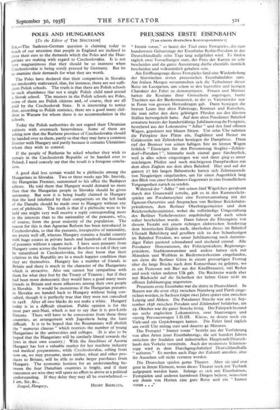POLES AND HUNGARIANS (To the Editor of THE SPECTATOR) SIR, —The
Sudeten-German question is claiming today so much of our attention that people in England are inclined to dose their ears to the demands which the Poles and the Hun- garians are making with regard to Czechoslovakia. It is not very magnanimous that they should be so insistent when Czechoslovakia is being sorely pressed by Germany. But let us examine their demands for what they are worth.
The Poles have declared that their compatriots in Slovakia are intolerably maltreated, that, for instance, there are not suffi- dent Polish schools. The truth is that there are Polish schools in such abundance that not a single Polish child need attend a Slovak school. The masters in the Polish schools are Poles, some of them are Polish citizens and, of course, they are all paid by the Czechoslovak State. It is interesting to notice that, according to Polish statistics, there are a good many chil- dren in Warsaw for whom there is no accommodation in the schools.
Today the Polish authorities do not regard their Ukrainian subjects with overmuch benevolence. Some of them are asking now that the Ruthene province of Czechoslovakia should be handed over to them, partly so that they may have a common frontier with Hungary and partly because it contains Ukrainians whom they wish to control.
If the people of Ruthenia be asked whether they wish to remain in the Czechoslovak Republic or be handed over to Poland, I need scarcely say that the result is a foregone conclu- sion.
A good deal less certain would be a plebiscite among the Hungarians in Slovakia. Two or three weeks ago Mr. Imredy, the Hungarian Premier, summoned to his office the Budapest editors. He told them that Hungary would demand no more than that the Hungarian people in Slovakia should be given autonomy. But now it is being loudly claimed in Hungary that the land inhabited by their compatriots on the left bank of the Danube should be made over to Hungary without any sort of plebiscite. The truth is that if a plebiscite were to be held one might very well receive a reply corresponding more to the interests than to the nationality of the peasants, who, of course, form the great majority of the population. The reason for this is that Agrarian Reform has been introduced in Czechoslovakia, so that the peasants, irrespective of nationality, are pretty well off, whereas Hungary remains a feudal country with huge estates in private hands and hundreds of thousands of peasants without a square inch. I have seen peasants from Hungary come across the frontier at Berehovo to ask if they can be naturalised in Czechoslovakia, for they know that their relatives in the Republic are in a much happier condition than they are themselves. Hungary has a number of friends in Britain and there is much in the character of the Hungarians which is attractive. Also one cannot but sympathise with them for what they lost by the Treaty of Trianon ; but if they had been more democratic they would have a good many more friends in Britain and more adherents among their own people in Slovakia. It would be monstrous if the Hungarian peasants in Slovakia are handed back to Hungary without being con- sulted, though it is perfectly true that they were not consulted in 1918. After all two blacks do not make a white. Hungary today is in a difficult situation. Public opinion is for the most part anti-Nazi, which is not to say that it is pro-Little Entente. There will have to be concessions from those three countries, an arrangement with Jugoslavia being the least difficult. It is to be hoped that the Roumanians will abolish the " numerus dausus " which restricts the number of young Hungarians in the universities and colleges. (It is also to be hoped that the Hungarians will be similarly liberal towards the Jews in their own country.) With the Anschluss of Austrii Hungary has lost a valuable market for her machine industry and medical preparations, while Czechoslovakia, selling from now on, we may presume, more timber, wheat and other pro- ducts to Britain, will be able to make larger purchases from Hungary. The economic horizon for an understanding be- tween the four Danubian countries is bright, and if their statesmen are wise they will spare no effort to arrive at a political understanding. If they delay they may all be overwhelmed.— I am, Sir, &c.,














































 Previous page
Previous page